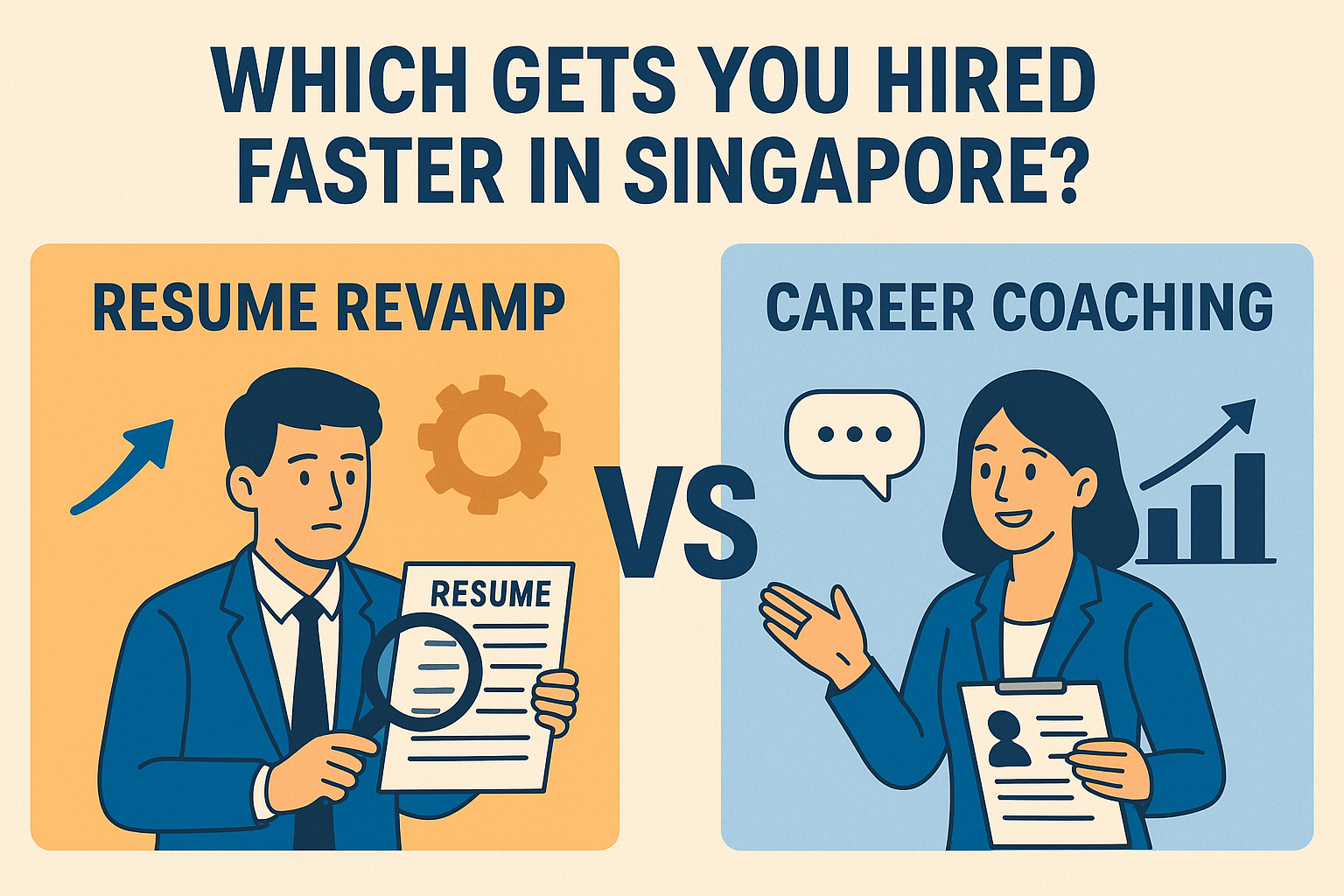Let’s be honest—when you hear the term life coach, you might picture someone cheerleading you through motivational quotes and goal-setting exercises. On the other hand, psychologist might bring to mind a more clinical, therapeutic setup involving deep emotional work. But when you see both terms being used in Singapore’s personal development space, the line between the two can feel blurry.
So it’s only natural to wonder: Are life coaches in Singapore also psychologists? Are the two the same? If not, what’s the actual difference—and does it matter when you’re choosing who to work with?
Let’s unpack it all with a clear, no-jargon explanation—because when it comes to your personal growth, mental health, and decision-making, you deserve to make informed choices.
What Is a Life Coach (Really)?
A life coach is someone who helps you move from where you are to where you want to be—by helping you set goals, gain clarity, overcome blocks, and take action. They work with you in a forward-focused way, often blending strategic planning with mindset work. Think of them as a partner who holds space for your growth, while also challenging you to step outside your comfort zone.
In Singapore, life coaching has grown in popularity among professionals, entrepreneurs, parents, and individuals in transition—like those changing careers or navigating personal crises. A coach can help you clarify what you really want, improve your confidence, or shift limiting beliefs that keep you stuck. Learn more about working with a life coach.
But—and this is important—life coaches are not medical professionals, and they don’t diagnose or treat mental health disorders. While they can support emotional wellness and self-awareness, their work is not a replacement for therapy or psychological treatment.
What Is a Psychologist?

A psychologist, on the other hand, is a trained and licensed mental health professional who has studied human behavior, emotions, cognition, and mental health disorders. In Singapore, psychologists typically hold advanced degrees (Master’s or PhD) and may be registered with the Singapore Psychological Society or equivalent professional bodies.
They are trained in evidence-based therapeutic techniques—like Cognitive Behavioral Therapy (CBT), Acceptance and Commitment Therapy (ACT), and other clinical approaches. Psychologists can work with clients who are experiencing depression, anxiety, trauma, or other mental health concerns, providing diagnosis, structured treatment plans, and therapeutic support.
Where a life coach helps you build momentum and navigate personal goals, a psychologist helps you heal, understand, and resolve deeper emotional or psychological issues. This is a fundamental distinction, and it’s where the confusion often starts.
So, Are Life Coaches in Singapore Also Psychologists?

Short answer: Not necessarily.
Most life coaches in Singapore are not psychologists. While both professions aim to help people grow and thrive, they come from very different training backgrounds. A psychologist typically holds an advanced degree in psychology, is trained in mental health diagnostics, and is licensed to offer therapy. A life coach, on the other hand, doesn’t need a psychology degree or clinical license. Coaching is a separate profession altogether.
In Singapore—just like in many other countries—life coaching is an unregulated industry. That means technically, anyone can call themselves a “life coach” without formal certification. Some coaches are highly trained and credentialed by reputable global organizations; others may have no professional training at all. This is why it’s so important to research your coach’s background, qualifications, and client approach before committing.
That said, some life coaches do have a background in psychology or counselling, and that can certainly enhance their coaching style. However, having a psychology background doesn’t automatically make someone a psychologist. The title “psychologist” is legally protected in Singapore and refers to someone who has undergone rigorous academic training and clinical supervision, and is registered with a relevant professional body.
At the same time, you’ll find that some psychologists in Singapore offer coaching services, especially in areas like personal development, career transitions, or executive leadership. But they usually make it clear whether they’re working in a therapeutic or coaching capacity during a session. This helps maintain professional boundaries and ensures the right kind of support is being offered.
Why does this distinction matter? Because your specific needs determine whom you should work with.
Here’s an example:
Imagine you’re feeling stuck in your career. You’ve been in the same role for five years and are toying with the idea of switching industries, but self-doubt keeps creeping in. You’re not clinically depressed or anxious—you’re just overwhelmed by choices and want guidance.
A life coach might be the perfect fit. They’ll help you unpack your values, clarify what you want, explore your options, and create an action plan to move forward. The focus is on goals, mindset, and future outcomes.
Now imagine a slightly different scenario. You’re also feeling stuck, but in addition to career confusion, you’re constantly exhausted, tearful, and can’t sleep. You’ve lost interest in things you used to enjoy, and this has been going on for weeks. That’s when you may need to see a psychologist, who can assess whether you’re experiencing clinical burnout or depression, and offer evidence-based therapy to support your emotional recovery.
The bottom line? Life coaches and psychologists serve different purposes. There’s no one-size-fits-all solution—just the right support at the right time. Choosing between a coach and a psychologist depends on where you are mentally and emotionally, and what kind of change you’re truly looking for.
Coaching vs. Therapy: The Key Differences
Let’s break it down in a human way:
- If you’re dealing with unresolved trauma, chronic anxiety, depression, or any condition that’s interfering with your day-to-day functioning, a psychologist (or therapist) is the right professional to turn to. They are trained to handle these deeper issues with clinical care.
- If you’re feeling mentally well but stuck, unmotivated, or unsure about your next life move, a coach can help you move forward. You might be grappling with decisions, confidence issues, or a sense that you’re capable of more—but you don’t need mental health treatment per se.
Here’s a practical example:
Let’s say you’re considering a career change. If you’re simply confused and want someone to help you explore options, set goals, and build momentum, a life coach can guide you. But if your indecision stems from burnout, chronic stress, or past trauma that’s unresolved, a psychologist would be more suitable.
In many cases, both coaching and therapy can work beautifully together. They’re not rivals—they’re allies. Some people see a psychologist for deep healing and work with a coach to create goals and rebuild confidence. It’s not either/or—it can be both/and, depending on what you need most at a particular time.
Why the Confusion Exists in Singapore
In Singapore’s high-performance culture, coaching and therapy are often talked about interchangeably—especially on social media. The stigma around mental health has decreased significantly in the past few years (which is great), but many people still find it easier to say “I have a coach” than “I see a psychologist.”
As a result, some coaches take on roles that border on therapeutic support, even if they aren’t trained psychologists. And that’s risky—because without proper psychological training, well-meaning advice can do more harm than good, especially for clients dealing with emotional trauma or mental health conditions.
Another reason for confusion? Many professionals now wear multiple hats. For example, a certified coach might also be a licensed counselor or psychologist. That’s not a problem—as long as they’re transparent about which service they’re offering you and don’t blur boundaries between coaching and therapy.
So, How Do You Choose the Right Professional?

The real question isn’t whether a coach is also a psychologist.
The real question is: What kind of support do you need right now?
Ask yourself:
- Am I looking to heal or to grow?
- Do I need to process emotional pain, or do I want help making confident decisions?
- Do I want someone to guide me forward or someone to help me unpack my past?
Here’s how to make an informed choice:
- For deep emotional healing or mental health support – Go to a psychologist or licensed therapist. Look for credentials, licensure, and evidence-based methods.
- For guidance, goal-setting, and confidence-building – Work with a certified life coach who has experience helping people through similar transitions.
- For both – Consider working with a professional who offers integrated services, or work with both a psychologist and a coach in parallel (with clear boundaries between roles).
And most importantly, trust your gut. A good coach or psychologist will never pressure you to continue if they sense your needs are outside their scope. They’ll refer you to someone better suited, and that’s a sign of integrity—not weakness.
What to Look for in a Life Coach in Singapore
If you’re thinking about working with a life coach, here are a few things to consider:
- Qualifications & Training: While coaching isn’t regulated, reputable coaches often have certifications from bodies like the International Coaching Federation (ICF) or other coaching institutes.
- Background: Some coaches have psychology, counselling, or corporate experience that adds depth to their work.
- Testimonials & Track Record: Ask about their past client work. Look for real, human stories of transformation—not just polished taglines.
- Approach: Every coach works differently. Some are action-oriented and structured; others are reflective and intuitive. Find someone whose style aligns with your needs.
- Ethics: A strong coach will clearly define their boundaries and refer you out if your needs fall into the realm of therapy.
And always book a consultation first. It’s the best way to sense if there’s rapport and trust—because the right fit matters more than any credential on paper.
In a Nutshell: Coaching Isn’t Therapy—But It’s Still Powerful

To wrap this up: Most life coaches in Singapore are not psychologists, and that’s okay.
They’re not trying to be. The goal of a coach is not to diagnose, treat, or analyze your mental health. Instead, it’s to empower you to step into your potential, make aligned decisions, and move forward with clarity and confidence.
That said, life coaching can still be deeply transformative—especially when offered by someone with psychological insight, strong ethics, and a client-centered mindset.
If you’re clear on what you need and find the right fit, working with a life coach can become one of the most empowering steps on your personal development journey.
So don’t worry about titles. Worry about alignment. Look for someone who listens deeply, understands your goals, and respects the boundaries between growth and healing.
When in doubt, ask questions. A trustworthy professional—whether a coach, psychologist, or someone who integrates both—will always respect your curiosity.
Ready to explore life coaching in Singapore?
If you’re curious about whether life coaching is right for you, or you’re looking for a psychologist-coach hybrid who brings the best of both worlds, we invite you to explore our services.
You don’t need to have all the answers to take that first step.
Book a session today—and begin your journey with someone who truly gets it.









0 Comments